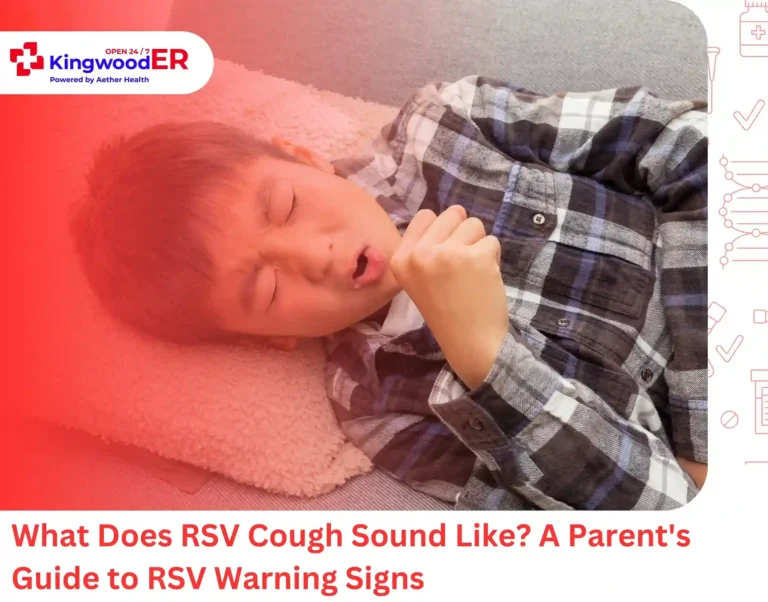When your fever climbs above 104°F, every hour counts before complications like seizures or organ damage become real threats. But here’s what most people don’t realize: emergency departments can reduce even dangerous fevers to safe levels within 30-60 minutes.
But how does the ER treat high fever so much faster than anything you can do at home? The answer lies in rapid fever reduction measures, including IV medications, active cooling techniques, and diagnostic testing that identify the root cause within minutes.
Let’s understand ER fever treatment protocols and when your fever becomes a true emergency requiring immediate professional intervention.
Temperature Thresholds: When Fever Becomes an Emergency

Medical professionals categorize fevers into distinct ranges that determine treatment urgency:
- Low-grade fever (99.1-100.4°F) typically indicates mild infection and can usually be managed at home with rest and hydration.
- Moderate fever (100.5-102.2°F) requires closer monitoring and may need medical evaluation if symptoms worsen or persist.
- High-grade fever (102.3-105.8°F) demands immediate medical attention, especially when accompanied by severe symptoms.
- Hyperthermic fever (>105.8°F) constitutes a medical emergency requiring immediate emergency intervention to prevent organ damage.
While a mild fever often indicates your immune system is working properly, certain situations require immediate medical attention. The threshold from manageable to emergency depends on temperature severity, accompanying symptoms, and individual risk factors.
At What Temperature Should I Go to the ER?
Emergency care requirements vary significantly by age group and individual circumstances:
Age-Specific Emergency Criteria:
- Infants (0-3 months) need immediate ER evaluation for any fever above 100.4°F (38°C). Their immature immune systems cannot effectively fight infections, making even slight temperature elevation potentially serious.
- Children (3 months-12 years) require emergency care when fever exceeds 102°F (38.9°C) with concerning symptoms like excessive irritability, lethargy, difficulty waking, or behavioral changes. Persistent fever lasting more than 2-3 days also warrants evaluation.
- Adults and adolescents (13+ years) need immediate treatment for fever above 103°F (39.4°C). Fever above 104°F (40°C) with severe symptoms requires emergency care. Those with compromised immune systems require evaluation at lower temperature thresholds.
High Fever Emergency Guidelines:
Any fever higher than 103°F needs to be treated right away in the ER. Additionally, seek immediate emergency care when fever is accompanied by other severe symptoms, such as severe headache with stiff neck, difficulty breathing or chest pain, confusion or altered mental state, signs of severe dehydration, and seizures or convulsions or severe pain.
Young children and elderly may be more susceptible to complications, making immediate medical evaluation crucial even at lower temperatures.
How a High Fever Affects the Body
High fevers trigger complex physiological responses throughout your body. As internal temperature rises, your immune system releases chemicals to combat underlying infections. This process increases heart rate, respiratory rate, and metabolic demands.
While moderate temperature increases benefit infection-fighting efforts, prolonged or excessively high fevers can lead to serious complications including dehydration, seizures, and organ dysfunction. The body’s proteins begin deteriorating at temperatures above 106°F, potentially causing permanent damage.
Critical Symptoms of High Fever Indicating an ER Visit
Specific warning signs accompanying high fever require immediate medical attention:
Neurological symptoms:
- Severe headaches with stiff neck
- Confusion or altered mental state
- Seizures or convulsions
- Excessive sleepiness or difficulty waking
Respiratory symptoms:
- Difficulty breathing or shortness of breath
- Rapid or labored breathing
- Wheezing or persistent coughing
Circulation and hydration:
- Severe dehydration (dry mouth, minimal urination)
- Chest pain or rapid heartbeat
- Skin rash accompanying fever
- Signs of shock (pale, clammy skin)
If you or a loved one experiences any of these symptoms with fever, seek emergency medical care immediately.
Causes of High Fever
Multiple factors can trigger dangerous fevers that require emergency intervention:
- Infectious causes represent the most common triggers, including bacterial infections like pneumonia, meningitis, and sepsis. Viral infections such as influenza and COVID-19 can also cause dangerously high fevers. Fungal and parasitic infections, while less common, may produce severe temperature elevations in certain populations.
- Inflammatory disorders including autoimmune conditions like rheumatoid arthritis and lupus can cause fever spikes. Inflammatory bowel disease and post-surgical complications may also trigger significant temperature increases requiring emergency care.
- Heat-related causes encompass heat exhaustion, heatstroke, and prolonged sun exposure. Dehydration in hot environments often compounds these conditions, making emergency intervention necessary.
- Medication reactions from antibiotics, vaccination responses, and drug allergies can produce dangerous fever levels. Chronic conditions including certain cancers, blood disorders, and metabolic conditions may also manifest with high fever episodes.
How Does the ER Treat High Fever?
When you arrive at our ER with a high fever, our primary goal is to get your temperature down fast and figure out what’s causing it. Most patients see their fever drop significantly within the first hour.
What we do first
The moment you walk in, emergency physicians start three things right away:
- IV fever reducers like acetaminophen or ibuprofen because they work faster through your bloodstream than pills
- Cooling measures – ice packs, cooling techniques, whatever it takes to bring that temperature down quickly
- IV fluids to keep you hydrated and help your body cope with the fever
A nurse monitors your vital signs like blood pressure and heart rate constantly because fever affects your whole body, not just temperature.
Finding the root cause
Here’s something important to understand: fever is a symptom, not a diagnosis. While our medical team works to bring your temperature down, emergency physicians may order run tests to figure out what’s causing the fever:
- Blood work shows us if there’s an infection and how your organs are handling the stress
- Urine tests check for infections that might be driving the fever up
- Imaging like X-rays or CT scans if your symptoms suggest complications
- Cultures to identify exactly which bacteria or virus is causing the problem
Targeting the real problem
Once the physicians know what we’re dealing with, treatment gets specific:
- Bacterial infections get antibiotics – we start broad-spectrum ones within the first hour, then narrow it down once test results come back
- Viral infections might get antiviral medications if available
- Underlying conditions like autoimmune diseases get treated specifically
- Severe cases that need intensive monitoring get transferred to hospitals with specialized units
Treatment Results: Most dangerous fevers start dropping within the first hour of treatment. Your complete evaluation and getting stabilized usually takes 2-4 hours total. Our rapid response approach prevents most fever complications before they develop.
What to Bring and Expect When Seeking Emergency Treatment for High Fever

Proper preparation streamlines emergency care and reduces treatment delays:
Essential items to bring:
- Current medications list
- Medical insurance information
- Photo identification
- Recent medical records if available
What to expect:
- Registration & Triage: Provide basic information while a nurse evaluates your symptoms and vital signs. Be ready to share when your fever started, how high it’s been, and current symptoms like nausea, pain, or cold-like symptoms.
- Examination room: Detailed evaluation by the medical team. The physician may ask about recent illnesses, travel, chronic health conditions, and any medication allergies to ensure safe treatment.
- Diagnostic testing: Blood work, imaging, or cultures based on your specific symptoms and medical history.
- Treatment: Immediate fever reduction while addressing the underlying cause doctors identify through testing.
- Monitoring: Continuous observation until your temperature stabilizes and symptoms improve.
- Discharge planning: Detailed home care instructions or hospital transfer if advanced care is needed.
The entire process typically takes 2-4 hours depending on severity and underlying causes.
High Fever Post-Treatment Advice

Once the physicians have gotten your fever under control, recovery becomes your job. Here’s what you need to do to stay healthy and avoid coming back:
Rest and Recovery
Your body just fought a serious battle against infection. Give it time to finish the job by getting plenty of rest. Skip the gym, avoid heavy lifting, and ease back into normal activities slowly. Your immune system is still working to clear the infection completely.
Stay Hydration
Fever dehydrates you more than you realize. Drink water, sports drinks, or electrolyte solutions throughout the day. Check your urine. It should be light yellow, not dark. Skip alcohol and limit caffeine for now since both can mess with your recovery.
Keep Monitoring Your Temperature
Check your temperature twice daily with a good thermometer and write it down. If fever comes back, it might mean the infection isn’t gone yet. During recovery, avoid extreme temperature changes and use safe cooling methods for fever management to support proper healing.
Take Your Medication Right
If the physician prescribed antibiotics, take every single pill even if you feel better. Stopping early lets bacteria come back stronger. Use over-the-counter fever reducers exactly as recommended by your ER physician.
Follow-up Care
Call your regular doctor to keep them in the loop about your ER visit. And if you start feeling worse again or develop new symptoms, don’t wait; come back to the ER right away.
Why Choose Aether Health for Fever Emergencies
Aether Health emergency departments provide comprehensive fever management with distinct advantages:
- 24/7 availability: The Aether Health ER in Kingwood remains open every day of the year to provide immediate access to emergency fever treatment.
- Pediatric expertise: Our emergency physicians have specialized training in pediatric emergency care, crucial for managing fever in infants and children.
- Advanced diagnostics: On-site laboratory and imaging services provide rapid results for blood work, cultures, and diagnostic scans without delays.
- Minimal wait times: Kingwood ER facility offers significantly shorter wait times compared to hospital emergency departments.
- Comprehensive care: We provide complete evaluation, treatment, and coordination with specialists when advanced care is needed.
- Patient-centered approach: Our team prioritizes clear communication, keeping patients and families informed throughout the treatment process.
For high fever emergencies, Kingwood ER provides immediate access to specialized care with advanced diagnostic capabilities and minimal wait times. Contact our ER for high fever emergency care in Kingwood and the surrounding areas.
FAQs
1. How quickly can the ER reduce a dangerous fever?
Emergency departments typically reduce dangerous fevers within 30-60 minutes using intravenous medications and cooling measures. The exact timeframe depends on fever severity and underlying causes.
2. What fever medications do ERs use that aren’t available at home?
ERs administer intravenous acetaminophen and ibuprofen for faster absorption, along with stronger prescription medications not available over-the-counter. They also use advanced cooling techniques like cooling blankets and cold saline.
3. Should I go to ER if fever lasts more than 3 days?
Yes, go to the ER for persistent fever lasting more than 3 days, especially if accompanied by worsening symptoms or if you’re in a high-risk group (infants, elderly, immunocompromised).
4. Can dehydration from fever become life-threatening?
Yes, severe dehydration from fever can cause organ failure, shock, and death if untreated. Warning signs include minimal urination, dry mouth, dizziness, and rapid heartbeat requiring immediate emergency care.
5. How do ERs treat fever in immune-compromised patients?
High-risk patients receive immediate evaluation even with low-grade fevers. Treatment includes aggressive diagnostic testing, broad-spectrum antibiotics, and close monitoring due to higher infection risks.
6. What’s the difference between fever emergency care for children vs adults?
Children require lower temperature thresholds for emergency care and age-specific medication dosing. ERs also focus more on behavioral changes and dehydration signs in pediatric patients.
7. When should you take a baby to ER for fever?
Any fever above 100.4°F in babies under 3 months requires immediate ER care. For older infants, emergency care is needed when fever exceeds 102°F with concerning symptoms or behavioral changes.
8. How long does ER fever treatment typically take?
Emergency fever treatment usually takes 2-4 hours, including evaluation, testing, treatment, and monitoring. Severe cases requiring hospitalization extend this timeframe for stabilization and admission processes.




